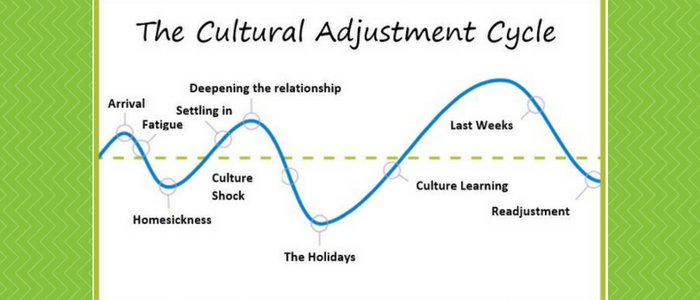Culture shock is a real, physical and psychological phenomenon – but what IS it? By understanding its patterns, exchange students and host families are so much better equipped to cope!
Cultural adjustment typically follows these patterns:
[perfectpullquote align=”right” cite=”” link=”” color=”” class=”” size=””]“There is a difference between arrival and entrance. Arrival is physical and happens all at once. Entering takes longer. You cross over, slowly, in bits and pieces. And then one morning, you open your eyes and you are finally here, really and truly here.”
― Jamie Zeppa [/perfectpullquote]
STAGE 1: “The Honeymoon”— Excitement!
- Excitement with new sounds, sights, smells (like a tourist)
- Lots of interest in learning, very motivated and cooperative
- You feel as if you will be able to handle anything— “I am not going to have any problems adjusting!”
STAGE 2: “Culture Shock”— Irritation/Hostility
- The novelty of the new culture has worn off, and you now focus primarily on the differences between the new culture and your home culture.
- Small differences feel like major catastrophes. You become overly concerned with and stressed out by problems and feel helpless and frustrated (teachers at school are assigning a lot of homework, the water tastes different, the bathroom stalls at school aren’t full doors, you can’t get the classes you want, etc.)
- You are homesick. You miss your friends and family back home—and to make matters worse, you hear that the weather back home is glorious and all your friends are having a big party and a grand time without you.

STAGE 3: Gradual Adjustment, Humor, and Perspective
- You feel more comfortable and less isolated, and you even begin to prefer some aspects of the American culture to your home culture.
- You feel like “As long as I am here, I should make the most of it.” You experience periodic personal highs and lows as adjustment gradually takes place.
- Your sense of humor returns. You are able to laugh at certain ways of doing things that previously just annoyed you and even to laugh at yourself from time to time.
STAGE 4: “Feeling at Home”— Adaptation and Biculturalism
- The “new” culture is no longer new; instead, the “foreign” country you live in now feels like another home.
- The aspects of American culture that are different from your home country no longer affect you in a negative way. You are able to live and work to your full potential.
- Just like you do back home, you appreciate certain aspects of the American culture and are critical of others.
Understanding culture shock is half the battle! Next, use these time-tested strategies to help you cope:
[perfectpullquote align=”left” cite=”” link=”” color=”” class=”” size=””]”I didn’t even know WHY I felt like a different person, why everything felt so difficult, and why I couldn’t just be happy. It helped so much when I realized this was normal!” – Andrea from Germany[/perfectpullquote]
Personal Supports
- Understand the stages of cultural adjustment. Expect things to be different.
- Be patient; don’t try to understand everything immediately; identify what helps you manage stress.
- Identify ways of thinking positively; foster your sense of humor; don’t take things too seriously; give yourself permission to fail.
Social Supports
- Identify your local sources of support (iE local coordinator and regional director, other exchange students, host family, teachers, etc.) and the types of support that each can offer.
- Plan in advance how you will keep in contact with family and friends back home. Be intentional, but don’t over-do it.
- Don’t isolate yourself! Seek out friends and groups that share your interests and can facilitate your participation in social circles.
Physical Supports
- Eat in a healthy way and get plenty of rest.
- Identify any problems (e.g. not eating, binge eating, phone use) and make plans to manage them.
- Find safe and fun ways to exercise on a regular basis.
*Originally conceptualized by anthropologist Kalervo Oberg in a talk to the Women’s Club of Rio de Janeiro in 1954.
**Adapted and abbreviated from the office of International Programs at Princeton University, Cultural Adjustment Information